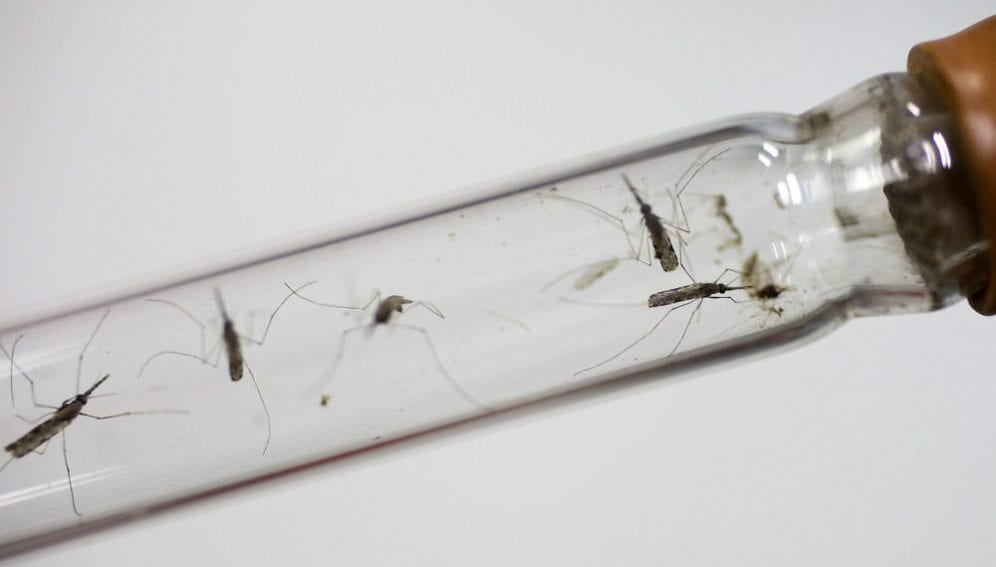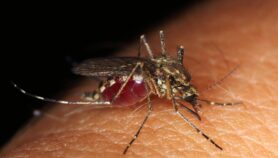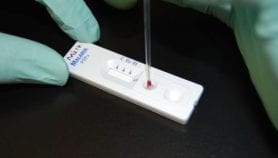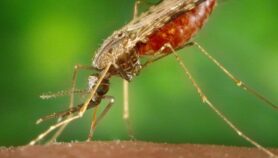Send to a friend
The details you provide on this page will not be used to send unsolicited email, and will not be sold to a 3rd party. See privacy policy.
[NAIROBI] A drug that fights malaria parasites also kills mosquitoes that feed on the blood of patients who have taken it at high doses, thus making the drug a potential weapon against the disease.
According to a study conducted in Kenya and published in The Lancet Infectious Diseases journal last month (27 March), adding high doses of ivermectin, an antimalrial that kills malaria parasites, to the antimalarial dihydroartemisinin-piperaquine could kill mosquitoes even 28 days after the start of treatment.
“These results suggest that ivermectin has the potential to become a novel tool for malaria control and elimination.”
Menno Smit, Liverpool School of Tropical Medicine
Menno Smit, a co-author of the study and a postdoctoral candidate in malaria epidemiology at the Liverpool School of Tropical Medicine, says that the ivermectin is a novel intervention which could be added to community-wide campaigns for mass drug administration to kill both mosquitoes and parasites.
According to Smit, a mathematical model that formed part of the study predicts that high-dose ivermectin increases the impact on malaria reduction by 61 per cent.
Researchers randomly assigned 141 eligible adults from western Kenya with malaria into three treatment groups: ivermectin 600 micrograms per kilogram body weight each day, half this dose per day and a placebo, all for three days. All the patients received the standard treatment with the antimalarial dihydroartemisinin-piperaquine.
During a follow-up, the participants gave up to six blood samples within 28 days after the start of treatment. Using an artificial membrane, the blood was fed to caged, laboratory-reared mosquitoes which were monitored daily for survival for 28 days after feeding, Smit says.
“Our study showed that ivermectin was well tolerated and able to kill mosquitoes feeding on people for at least 28 days after treatment”, according to the researchers.
“These results suggest that ivermectin has the potential to become a novel tool for malaria control and elimination,” Smit adds. “Ivermectin makes the blood poisonous to mosquitoes feeding on people who have recently been treated. Combining an antimalarial drug and ivermectin targets both the parasite and the mosquito.”
Willis Akhwale, founder and executive director at Kenya-based Continental Public Health Consulting and a malaria control specialist, says that the study is novel because it targets both the parasite and its vector.
“It is important to target both since at the elimination stage it is the parasite that is targeted for elimination and killing the vector also reduces transmission,” he tells SciDev.Net. “There is potentially an additive value if this new tool is combined with other current effective tools.”
Akhwale adds that this is a bold approach, especially considering the side effects of ivermectin when used for treating other parasitic conditions such as elephantiasis. Some of the side effects on joints and the gastrointestinal system are worse than those caused by malaria.
“Although the study looked at the toxicity and tolerability of the drug at high dosages used and showed significant safety findings, I am not sure if used on a large scale such as in mass drug administration the same results would be obtained,” Akhwale adds.He calls for studies into how genetic factors could influence the tolerability of the drug at high doses.
This piece was produced by SciDev.Net’s Sub-Saharan Africa English desk.
References
Menno R Smit and others Safety and mosquitocidal efficacy of high-dose ivermectin when co-administered with dihydroartemisinin-piperaquine in Kenyan adults with uncomplicated malaria (IVERMAL): a randomised, double-blind, placebo-controlled trial (The Lancet Infectious Diseases 27 March 2018)














